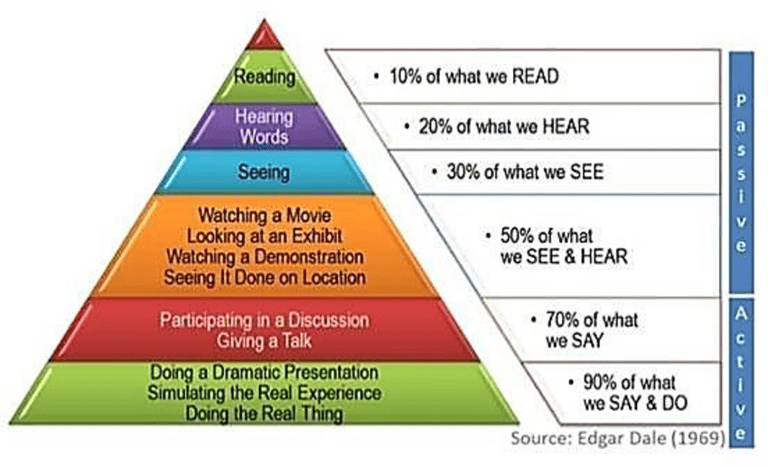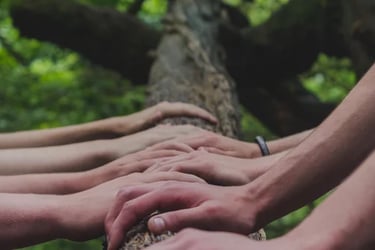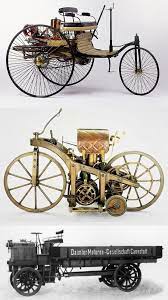New Launch: Family 'N' Friends: Rekindle happiness, harmony, passion and romance for young married couples
Why Adventure Experiential Learning Activities?
Team Building, Strategic Planning, Goal Clarity, Target Setting, Prioritising, and Focussed Action Leading to Results


Do You Know Experiential Learning Originated in India; Ancient Indian Gurukul System
This has been practised in India for thousands of years. It's a unique method where students live with their gurus in an ashram. The gurus impart knowledge on various subjects including scriptures, philosophy, mathematics, and science.
The students not only receive academic education but also learn values, discipline, and life skills. The Gurukul system promotes a holistic approach to education, focusing on the overall development of a student's mind, body, and spirit.


Management development outdoors is based on three proven facts:
A. People learn best when they are personally involved in the learning experience.
B. Knowledge to be truly meaningful has to be discovered by the individual via engagement.
C. People are more committed to learning when they are free to identify and pursue their own goals.
Experiential learning therefore emphasizes on
A. Direct personal experience
B. Building an individual’s commitment to development
C. Giving learners as great a responsibility as possible for drawing a conclusion


Methodology: Adventure Activity, Experiential Learning?
A. A tranquil ambience coupled with a break from the routine environment gives participants the required "manifestation” to be able to introspect and analyze themselves.
B. As facilitators we create situations which invite participants to discover their interpretation & solutions to challenging issues.
C. Participants are challenged to think differently, communicate effectively, solve problems creatively, display leadership, take risks, and actively support teammates.


Team Development- Why it's Important
A. A team is a collection of individuals directing their energies towards a defined goal, which is achieved through their joint, complementary efforts. If the team is working well, there’s energy, synergy and enthusiasm.
B. People are there because of what they can contribute, not because some organization chart says so. Teams don’t ‘gel’ overnight. They struggle through various stages of growth, and if they emerge triumphant at the end, it will be because they’ve worked at it.


Sales Target Setting and AOP-Annual Operating Plan
Activities provide practical hands-on experiences that allow them to apply their knowledge in real-world scenarios. Through team-building exercises, role-playing simulations, and problem-solving challenges, the teams learn how to effectively navigate, communicate, negotiate, and close deals. They also gain a deeper understanding of customer needs and preferences, enabling them to tailor their approach accordingly.
Adventure experiential learning activities boost the team's confidence, motivation, foster collaboration and trust. As a result, the sales team emerges with a renewed sense of clarity, purpose and a heightened ability to achieve their targets.
Goal setting is a skill that can be effectively learned through experiential activities. Individuals can better understand the process involved in setting targets. They gain insights into various strategies and techniques that can help them establish realistic and achievable goals.




Goals Clarity, Strategies, Priorities and Action
A. Successful teamwork starts with the question: What are we trying to achieve? Unless members of the team have clarity and agree on this fundamental point, they will be pulling in different directions and wasting their energies.
B. Within the team, there may be conflicting visions, priorities and personal goals to be reconciled. Beyond the team, some pressures and opportunities need to be considered. Teams need time to explore the issues.
C. The question cannot be answered once and for all. It will need to be reconsidered regularly as circumstances change. The team must be flexible in its working methods, and be prepared to review its strategies in response to new situations.
D. The process of establishing goals may be a painful one, as past experiences, assumptions and ways of working have to be challenged and perhaps replaced by new norms.




Key Takeaways/Aim
This would be derived from the “Training Need Analysis” done before the workshop. The aim could be any one or a combination of some of the following indicative lists.
A. Provide participants an opportunity to bond better with other members of the team.
B. Provide the participants' insights into various aspects of team dynamics
C. Build cross-functional synergies and collaboration.
D. Help teams identify their strengths, and areas for improvement and enhance their effectiveness.
E. Motivate teams to achieve their goals and objectives. Build a ‘can do’ attitude amongst teams.
Activities will inculcate the following leadership qualities
A. Self-discipline and character-building
B. Initiative, self-confidence and social adaptability
C. Sense of Responsibility and cooperation
D. Practical Intelligence and organizing Ability
E. Dynamism, Fear management and courage
F. Decision-Making and Ability to Influence






A few select activities and their bespoke customized debriefs, done by us
Caterpillar walk
Blind-Dumb Snake Walk
Moon/Jungle Walk
Disc(o) Ring
Hula Ring
Split Pipes
Flying Carpet
Cross Over Bridge
Nine Balls/Bull Ring
Save your Balloon
Fly your Airplane
Tower Building
Launch Craft
Number/Key Punch
Three Islands
Pass the Spider-web
Tanagram
Broken Squares
Jigsaw puzzle
Design your activity
Virtual Volleyball
Big/Small Rocks
Plank Race
Perfect Square
10 Fun Ways to Recap
Video Analysis Bad-Good


Let's Connect
Listening to your feedback and reading your comments makes me very happy. Contact me if you have any questions, comments, or information, or to request a quote. I will get back to you shortly. Remember that you can also follow me on my social networks or write to my email: PrabhjotSood@Gmail.Com
Let's Connect
+91 9653-422-055




